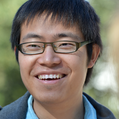KESHENG SHU
Email: This email address is being protected from spambots. You need JavaScript enabled to view it.
Tel. 0048 81 478
Climate change, energy transition, system analysis
EDUCATION
09/2008- 01/2015 Joint Ph.D. in Human geography, University of Hamburg & Institute of Geographic Sciences and Natural Resources Research, Chinese Academy of Sciences, Thesis “Sustainable Bioenergy Use and Climate Change in China - a Spatial Agent Model for the Case of Jiangsu Province”
09/2006- 07/2008 M.Sc. in Regional economics, Chongqing Technology and Business University, Thesis “Population Carrying Capacity Research on the Upper Reaches of the Yangtze River”
03/2004- 07/2006 M.Sc. B.Sc. in Economics, Wuhan University
09/2002- 07/2006 B.Sc. in Geology, China University of Geosciences
WORK EXPERIENCE
03/2017 Visiting scholar, Fudan University, Shanghai, China; External expert consulted for the project “Environmental impact assessment of Shandong mid-/long-term energy development plan (2016-2030)” and co-supervising graduate and undergraduate students
02/2015- 12/2017 Postdoctoral researcher, University of Hamburg, Germany; Hosting the postdoctoral research project “Bioenergy landscapes in China: blessing or curse?”
08/2014- 01/2015 Teaching assistant, University of Hamburg, Germany; Teaching assistant of the course “Anthropogeography B: International security and conflict geography”
10/2013- 03/2014 Research assistant, University of Hamburg, Germany; Building a comprehensive decision support system of bioenergy industry in China by using GAMS
10/2012- 06/2013 Visiting scholar, Institute for advanced studies on science, technology and society (IAS-STS), Graz, Austria; Constructing land use model for biomass provision by using GAMS
04/2012- 03/2014 Activities coordinator, PIASTA, University of Hamburg, Germany; Planning and organizing social and academic activities for PhD students enrolled in Hamburg University
02/2009- 06/2009 Lecturer, Beijing City University, Beijing, China; Teaching “Environmental Chemistry” for students in the major of urban, rural planning and resource management
02/2007- 06/2007; Lecturer, Chongqing Technology and Business University, Chongqing, China; Teaching “Principle of Economics” for students in the major of marketing
PUBLICATIONS
Shu K, Kozak M, Fradj NB, Zylowski T, Rozakis S. Simulation of sorghum introduction and its impacts on land use change—A case study on Lubelski region of Eastern Poland. GCB Bioenergy. 2020;12:252–274. https ://doi.org/10.1111/gcbb.12669
Konstantinis, A., Rozakis, S., Maria, E.-A. Shu, K. (2018). A definition of bioeconomy through the bibliometric networks of the scientific literature. AgBioForum, 21(2), 64-85. Available on the World Wide Web: http://www.agbioforum.org
Shu K., Scheffran J., Schneider U.A., Yang L., Elflein J., Reconciling food and bioenergy feedstock supply in emerging economies: Evidence from Jiangsu Province in China, International Journal of Green Energy, 6(2017), 509-521.
Shu K., Schneider U.A., Scheffran J., Optimizing the bioenergy industry infrastructure: transportation networks and bioenergy plant locations, Applied Energy, 4(2017), 247-261.
Shu K., 2016. The construction of competitive bioenergy industry in China: Status quo and prospects, in: A. Bammé, G. Getzinger and T. Berger (Eds.), Yearbook 2014 of the Institute for Advanced Studies on Science, Technology and Society. Profil, Munich and Vienna.
Shu K., Schneider U.A., Scheffran J., Bioenergy and food supply: A spatial-agent dynamic model of agricultural land use for Jiangsu province in China, Energies, 8(2015), 13284-13307.
Shu K., Sustainable bioenergy use and climate change in China: A spatial agent model for the case of Jiangsu Province. Hamburg, Germany: University of Hamburg; 2015.
Jin X., Dong S., Luo L., Li Y., Yuan C., Shu K., & Chen J., Environmental effects of foreign trade and its spatial variations in mid-eastern provinces and cities of China. Chinese Geographical Science, 22(2012), 626-636.
Shu K., Huo M., Discussion of the Chinese development strategies of geothermal resources based on the circular economy, World Geothermal Congress 2010.
Shu K., Huo M., Application of remote sensing technology in geothermal exploration: a case study of Taizhou city in Jiangsu province, World Geothermal Congress 2010.
Shu K., The research on the division of the development priority zones on the basis of relative carrying capacity of resources information:A case study of the Yangtze River Basin, Areal Research and Development, 1(2010),33-37.
Shu K., The reconstruction of economic circle division model: Take Chongqing One Hour Economic Circle as an example, The Research on Balancing the Urban and Rural Development, 3(2009), 26-32.
Shu K., Population carrying capacity research on the Upper Reaches of the Yangtze River. Chongqing, China: Chongqing Technology and Business University; 2008.
Shu K., Zhong C., Demonstration analysis to increase peasant’s income in Chongqing on the background of balancing the urban and rural development, The Research on Balancing the Urban and Rural Development, 3(2008), 18-22.
Wang J., Shu K., The review of the contribution of higher education to economic growth, Rural Area Economic and Technology, 12(2007), 119-120.
Tang X., Shu K., A study on the dynamic model of the population-carrying capacity in the region of Three Gorges of the Yangtze River, South China Population, 4(2007), 60-63.
Tang X., Shu K., Carrying capacity for population in the region of Three Gorges of the Yangtze River and its immigrant expansion, Journal of Chongqing Technology and Business University (Western Forum), 3(2007), 42-45.








